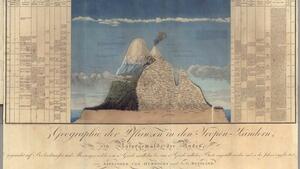
This course will offer a cultural and critical perspective of the way ecology, natural disasters, and human actions are intrinsically intertwined.
In recent years powerful earthquakes in Mexico, the strongest hurricane ever recorded devastating the island of Puerto Rico in 2017, and severe floods and landslides in the northwestern coast of South America have served as constant reminders of how natural disasters can affect our relationship with the environment. How does climate (the combination of geography and environment) influence culture, politics, and history? Is the preoccupation with climate something recent, a response to our contemporary way of life, or does it have a cultural history of its own? There is no doubt that earthquakes, volcanoes, hurricanes, droughts, and epidemic diseases constitute environmental conditions that affect the manner in which individuals live and interact with each other. In this sense, it is important to pay attention to the manner in which people, governments, and societies have historically responded to them.
This course will offer a cultural and critical perspective of the way ecology, natural disasters, and human actions are intrinsically intertwined. We will examine visual and written materials that depict and articulate how natural disasters and climate in general have impacted human interactions and ecosystems in Latin America from the early modern period to contemporary times. Finally, we will particularly focus on the manner in which cultural identities and human lives were affected by the way ecosystems were changed and transformed as a result of the arrival of the Europeans and African slaves to the Americans and their interactions with indigenous people. A part of the course will be devoted to theoretical discussions pertaining to ecocriticism and environmental studies.
Fall 2019
Tuesdays/Thursdays 12:30pm – 1:50pm
Prof. Mariselle Meléndez